Image: Kashmir Singh, 56, a farmer, inspects his sunflower crop in a field at Dharar village.
Photographs: Reuters.
Photographs: Reuters.
Good news for farmers, loans at 4%
Image: A farmer carries bundles of straw amid dense fog on the outskirts of Agartala, capital of Tripura.Photographs: Jayanta Dey/Reuters.
"The existing interest subvention scheme of providing short-term crop loans at seven per cent interest rate will continue during the 2011-12 fiscal," Finance Minister Pranab Mukherjee said in the Budget proposals. He also said the credit target for the agriculture sector has been increased by Rs 1 lakh crore to Rs 4,75,000 crore (Rs 4.75 trillion).
. . .
Good news for farmers, loans at 4%
Image: A farmer pulls a wooden plank to level the soil in a paddy field on the outskirts of the Allahabad.Photographs: Jitendra Prakash/Reuters.
Also, banks have been asked to focus on farm credit lending to small and marginal farmers, he added. "In the last Budget, I had provided an additional two per cent interest subvention to those farmers who repay their crop loan on time. In order to provide further incentive to these farmers, I propose to enhance the additional subvention to three per cent in 2011-12. The effective rate of interest for such farmers would be four per cent," he said.
. . .
Good news for farmers, loans at 4%
Image: A farmer works in a pulse farm at Bakrol village on the outskirts of Ahmedabad.Photographs: Amit Dave/Reuters.
Faced with high food inflation and the country's dependence on import of pulses and edible oil, the finance minister also announced various schemes for promoting production of vegetables, pulses, oilseeds, fodder and nutrition-rich crops like millets and maize. The basic customs duty on agricultural machinery reduced to 4.5 per cent from 5 per cent.
Good news for farmers, loans at 4%
Image: Govt to boost agri output.
Govt allocates Rs 2,200 cr for boosting agri output Aiming to control price rise in non-cereal food items, the government today announced a budget outlay of Rs 2,200 crore (Rs 22 billion) to boost production of vegetables, pulses, oilseeds, millets and fodder. The government also decided to continue the existing two schemes -- one for Green Revolution in eastern states with an allocation of Rs 400 crore (Rs 4 billion)and the other to promote pulses' output scheme with an outlay of Rs 300 crore. In his 2011-12 Budget speech, Finance Minister Pranab Mukherjee announced Rs 300 crore each for new schemes to step up production of vegetables, oil palm, nutri-cereals, protein supplements and fodder.
. . .
Good news for farmers, loans at 4%
Image: Food inflation remains a concern.
"The recent spurt in food prices was driven by increase in prices of items like fruits and vegetables, milk, meat, poultry and fish, which account for more than 70 per cent of the WPI basket for primary food items. Removal of production and distribution bottlenecks for these items will be the focus of my attention this year," Mukherjee said. He added that food inflation on average has declined but it still remains a concern. For early take off of new schemes, the Finance Minister said the budget allocation have been made under the ongoing Rashtriya Krishi Vikas Yojana (RKVY), which incentivises states to invest in farm sector and achieve four per cent growth.
. . .
Good news for farmers, loans at 4%
Image: Costlier imports of cooking oils.
"The total allocation of RKVY is being increased from Rs 6,755 crore in 2010-11 to Rs 7,860 crore in 2011-12," he said. On pulses, Mukherjee said although production has risen by nearly two million tonnes in 2010-11, "we must strive to attain self-sufficiency in production of pulses within the next 3 years." To further increase production, he proposed to provide Rs 300 crore to promote 60,000 pulses villages in rain-fed areas. Production is expected to touch a record 16.5 million tonnes this year against 14.66 million tonnes last year. Concerned over costlier imports of cooking oils, he said.
. . .
Good news for farmers, loans at 4%
Image: Boost for palm plantation.
"We have to pay special attention to oil palm as it is one of the most efficient oil crops" and made budgetary allocation of Rs 300 crore to bring 60,000 hectares under palm plantation by integrating the farmers with the markets. "The initiative will yield about 3 lakh metric tonnes of palm oil annually in 5 years," he added. The domestic production of edible oil meets only about 50 per cent demand. The gap is met through imports. To meet growing demands of vegetables, Mukherjee stressed on the need to establish an efficient supply chain to provide quality vegetables at competitive prices and announced Rs 300 crore to set up a vegetable cluster. To begin with, this programme will be launched near major urban centres, he added.
. . .
Good news for farmers, loans at 4%
Image: More funds for production of nutri-cereals.
The Finance Minister also made a provision of Rs 300 crore to enhance production of nutri-cereals like bajra, jowar, ragi and other millets. "The programme (on nutri-cereals) would be taken up in 1,000 compact blocks covering about 25,000 villages. This will help improve nutritional security and increase feed and fodder supply for livestock," he said. Mukherjee also announced a new scheme 'National Mission for Protein Supplements' with an outlay of Rs 300 crore "to promote animal-based protein production through livestock development, dairy farming, piggery, goat rearing and fisheries in selected blocks." In order to maintain an adequate supply of fodder for sustained milk production, he proposed to provide a budget of Rs 300 crore for fodder development in 25,000 villages. Expressing concerns over deteriorating soil health due to indiscriminate use of chemical fertilizers, Mukherjee said the government will promote organic farming.

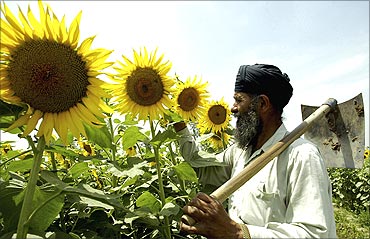

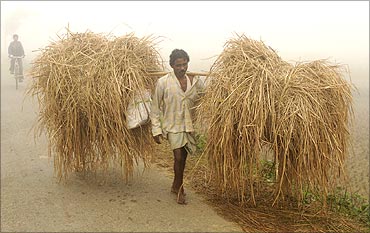

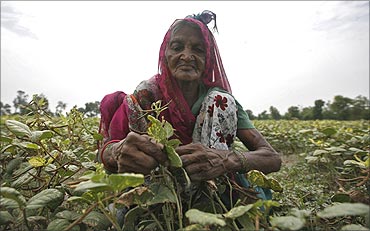
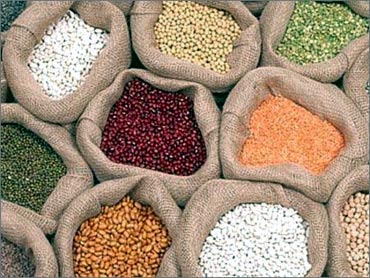

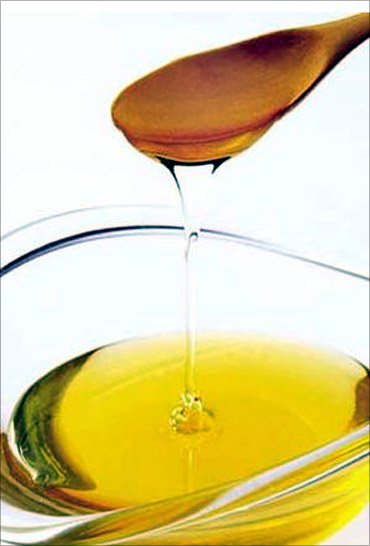
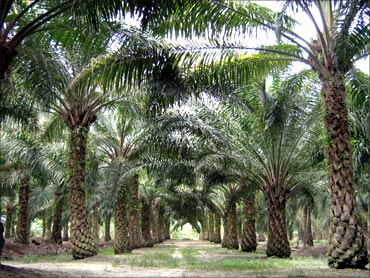
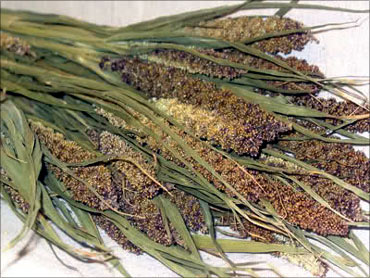
article